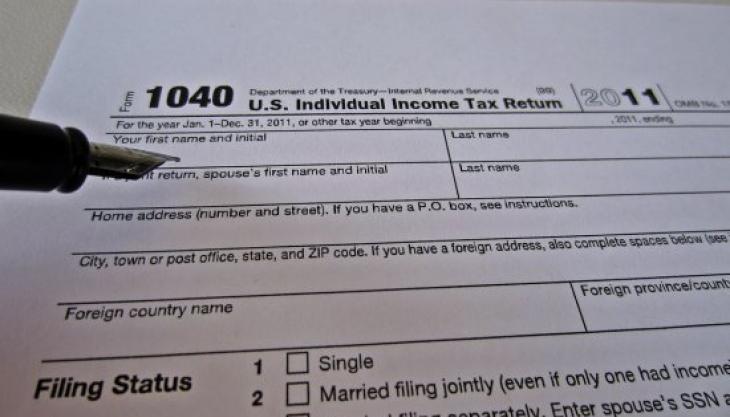No 1040 Returns Filed? Big Problem! 5 Big Facts About Income Taxes and Bankruptcy
Submitted by Rachel R on Tue, 03/01/2016 - 9:59am

Income taxes are an important part of bankruptcy
Image Source: Flickr User 401(K) 2012
If you’re deep in debt and considering filing bankruptcy of any chapter, you should know that your income tax status is critical to the success of your bankruptcy. And if you’ve skipped filing any (or all) of the most recent years of tax returns, you’ll have to straighten this out during bankruptcy. However, don’t panic – it’s usually straightforward to deal with delinquent or unfiled taxes in bankruptcy.
Check out these five facts about delinquent, non-filed, or late income taxes in bankruptcy.
#1 You must submit filed income tax forms in any bankruptcy chapter
No matter if you’re filing Chapter 7, Chapter 13 or a personal or business Chapter 11, you’ll be required to submit your last few years of income tax returns and these must have been filed with the IRS – even if you couldn’t afford to pay the taxes. Because you’re required to list all of your assets and debts, that includes any potential tax refunds and unpaid tax obligations.
#2 Chapter 13 requires four years of tax forms
If you’re filing Chapter 13, you’ll have to provide tax returns for the four years preceding the year you file your Chapter 13 petition. If you haven’t filed the tax returns before the bankruptcy filing date, you have a small window of leeway. You have until just prior to your 341 Meeting of Creditors to submit these to the IRS and the court. This will occur 21 - 50 days after you file your petition.
#3 Chapter 7 requires just the past year’s tax form
With Chapter 7, you only have to submit one year’s prior tax form, but if you’ve failed to file others, you should catch up. You may find that if you are owed a refund in a recent prior year, even if you didn’t file, forms can be filed retroactively to offset any tax debt. The tax returns must be submitted to the court by the time of your 341 Creditor’s Meeting, which is set for 21 - 40 days after you file the petition.
#4 If you don’t file taxes, you can’t discharge the debt
Older tax debts can be discharged in Chapter 7 and reduced and possibly discharged in Chapter 13 as well but only if the returns are filed and the taxes have been assessed by the IRS. Generally, tax debts older than two years from the date of your petition date are eligible to be included in Chapter 7, and more current taxes can be included in Chapter 13 bankruptcy as part of your repayment plan.
#5 Not filing returns can derail your discharge
If you failed to file your taxes as required, you might see your bankruptcy discharge withheld since the US Bankruptcy code requires tax forms to be submitted and properly disclosed as part of your petition for either Chapter 7 or Chapter 13 bankruptcy. To get the best results, be sure to file your taxes either before you file – or catch them up before your 341 Meeting of Creditors.
If you owe back taxes along with other debts, bankruptcy can help you get a clean slate and financial peace of mind. Contact the Law Offices of John T. Orcutt now for a free North Carolina bankruptcy consultation. Call +1-833-627-0115 now for a free appointment at one of our convenient locations in Raleigh, Durham, Fayetteville, Wilson, Greensboro or Wilmington.
Debts Hurt! Got debt? Need help? Get started below!
Serving All of North Carolina
- Bankruptcy Attorneys Raleigh NC (North)
- Bankruptcy Attorney Fayetteville NC
- Bankruptcy Attorney Durham NC
- Bankruptcy Attorneys Wilson NC
- Bankruptcy Attorneys Greensboro NC
- Bankruptcy Attorneys Southport NC
- Bankruptcy Attorneys Wilmington NC
Bankruptcy Attorneys Raleigh NC (North)
6616 Six Forks Rd #203 Raleigh, NC 27615 North Carolina
Tel: (919) 847-9750

Bankruptcy Attorney Fayetteville NC
2711 Breezewood Ave Fayetteville, NC 28303 North Carolina
Tel: (910) 323-2972

Bankruptcy Attorney Durham NC
1738 Hillandale Rd Suite D Durham, NC 27705 North Carolina
Tel: (919) 286-1695


Bankruptcy Attorneys Greensboro NC
2100 W Cornwallis Dr. STE O Greensboro, NC 27408 North Carolina
Tel: (336) 542-5993

Bankruptcy Attorneys Southport NC
116 N Howe St. Suite A Southport, NC 28461 North Carolina
Tel: (910) 218-8682

Bankruptcy Attorneys Wilmington NC
116 N. Howe Street, Suite A Southport, NC 28461 North Carolina
Tel: (910) 447-2987
